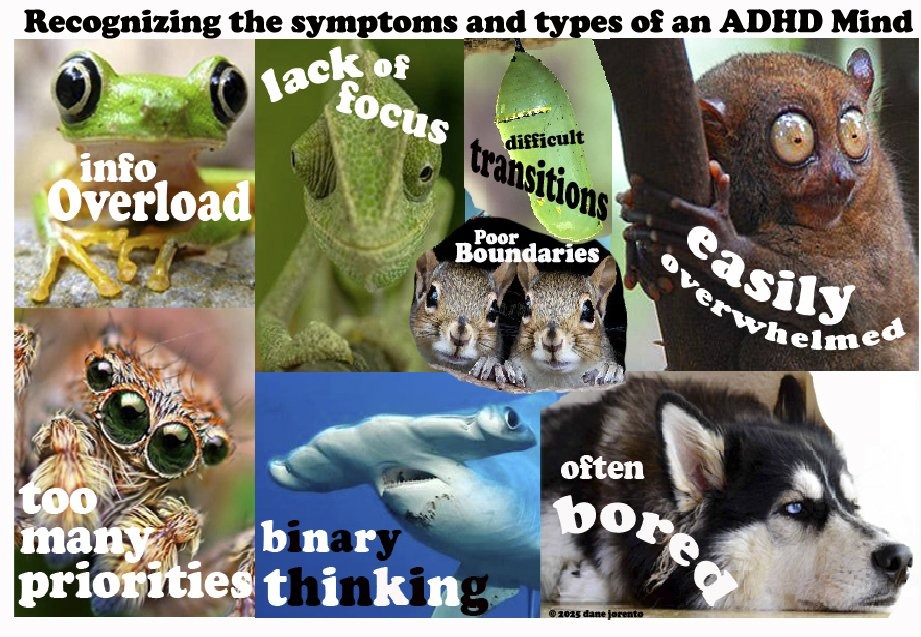Our brains are remarkably similar. Our minds are remarkably different. That is why we see neurological similarities in how the ADHD brain functions. And, why we see vastly different development, experiences and expressions of the ADHD mind.
Learning how to manage an ADHD mind requires looking close enough to mindfully see its features and functions. By looking closely at the process of an ADHD brain and mind, it becomes clear that ADHD is a mental health concern primarily related to cognition, or our thinking process. ADHD is not about feelings, even though emotional outbursts are common among individuals struggling with ADHD. ADHD is also not about relationships, but relationship difficulties are also common quite common for individuals struggling with ADHD. ADHD is not even about attention deficit. As discussed previously, attention, focus and concentration are different processes and require learning different skills and abilities to manage.
ADHD is first about thinking and then expands beyond thinking to focus on and consider information intake and processing. While the cognitive process of thinking might be similar in all human brains, how you mentally intake and process information is quite unique and diverse. Learning that you can intake and process information differently leads to the discovery that there are different types of ADHD.
Discovering that there are different types of ADHD usually leads to asking, “What type of ADHD do I have?” “What type of ADHD do you have?”
Go ahead and ask. Think about ADHD for a moment. Look at the picture above that visually expresses various types of the ADHD mind. Relax. Reflect. Mindfully ponder. When you come back, we’ll take a deep dive into the symptoms and types of ADHD.
Being mindful of how you think, feel, act and connect significantly improves the quality of your life because you are aware of your motivations for choices and your skills and ability to manage the results. “I think and therefore I am” is much more useful when expanded to “I think, feel, act and connect to myself, you and us, and therefore I am and we are.” Expanding awareness of essential and practical details help you discover how your unique life experiences interact with our universally shared process of living.
In part 1 about ADHD, I described asking clients, “What does ADHD mean to you?” And how they would usually respond, “It means I can’t pay attention.” I didn’t tell you about my follow up question, “How do you not pay attention?”
People do not pay attention in many different ways. Sometimes they are distracted and don’t hear something in the first place. Other times they hear it but question why it matters. Or they use the info as a starting point to expand and explore all the possibilities of what it might mean. They can integrate the info into previous discussions, evaluate it with their life experiences, or consider the context of a current relationship. You have almost unlimited options regarding how you process information with your mind.

How you think, or how you process info with your mind, is just one aspect of seeing and understanding the different types of ADHD. Thinking is how you deal with information, but your thinking process expands well beyond the thoughts in your head.
Where does that information come from? How well can you manage it? What info should be addressed first? What cognitive distortions are impacting your perspective? How comfortable are you dealing with difficult info?
There are many aspects beyond thinking, which include your personal history and experiences, feelings, beliefs, values, relationships, resources, challenges, culture, age, personal style, your vision of how you see yourself, goals of who you want to become and so more.
It is complex to assess what type of ADHD you may be struggling with… and yet, also pretty simple. Simple as knowing your problems. Simple in that you already are aware of the difficulties in your life. While you may want to avoid, ignore or suppress your uncomfortable difficulties, you know when you are struggling and wish things were different. The problems and symptoms you experience in your life are what define and reveal the type of ADHD challenges you are facing.

If you are struggling with holding onto too many priorities – the challenge is letting go. If you struggle with being bored – the challenge is to improve your ability to mindfully connect, engage and participate in meaningful and valued activities. If you are struggling with a lack of focus – the challenge could be related to self-esteem, boundaries, mindfulness or something else.
Each ADHD type reflects specific symptoms and struggles that reveal a BCA path towards harnessing a solution. Once you clearly understand what your ADHD problems are, you are ready to face the challenges of discovering the strengths being developed in your struggles. To gain insights, skills and abilities to harness the power of ADHD.
Dane Jorento, MSW, LICSW is a speaker available for keynotes, seminars, and workshops on mental health, emotional well-being, trauma, ADHD, self-esteem, relationships, and sexual health. His expertise includes BCA Holistic Therapy, EMDR, and DBT approaches.

